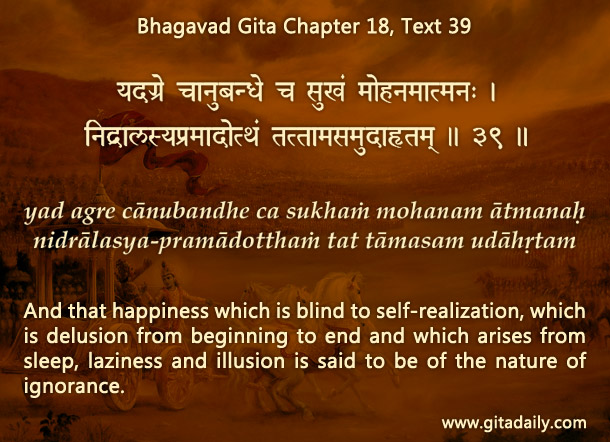Drunkards suffer terribly due to their addiction – the hangover, the mortification at finding oneself crazed out, the humiliation when one becomes an object of derision or revulsion for others, the long-term health complications, the not insignificant expense and worst of all the relentless craving that keeps coming again and again and yet again.
The whole condition is deplorable, even insufferable. And it is entirely unavoidable – if they would just give up giving in to the urge to drink. But the grip of illusion on them is so tight and so thorough that it makes them feel that the insufferable is irresistible – the very thing that makes their life so messy, that very thing they believe they can’t live without.
The Bhagavad-gita (14.13) indicates that such distorting and disastrous misperception is characteristic of the mode of ignorance. The Gita later (18.39) states that happiness in the mode of ignorance is simply a delusion from beginning to end. A typical example is the imaginary pleasure of madness (pramada), a state often caused by indiscriminate intoxication.
While addiction to alcohol or other such mind-dumbing objects may not influence everyone, the mode of ignorance does indeed influence everyone. And according to our specific conditionings, its spell frequently enslaves us to an irresistible fascination for something insufferable. And at the broadest generic level, for the soul who is by nature eternal, enlightened and ecstatic, and who is meant to delight in a life of endless love with Krishna, the reservoir of all pleasure, the entire material existence is an insufferable ignominy that, under the spell of illusion, appears irresistible.
By practicing devotional service steadily, the Gita (14.26) indicates that we can all go beyond the influence firstly of lower modes such as ignorance and eventually beyond all the modes to reclaim our joyful life, transcendental and eternal.


wonderful article!
There is some happiness found in the drop but as soon as we experience the happiness of the ocean the happiness of the drop becomes insignificant.
Thanks for sharing this.
@Hans: Good comparison 🙂